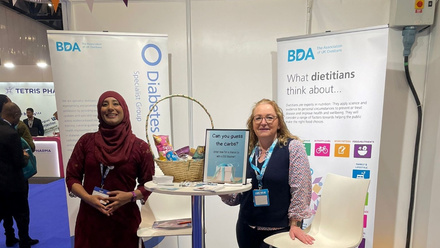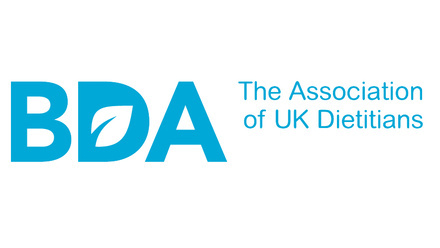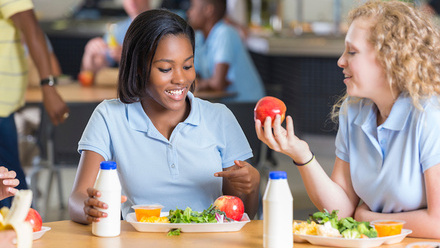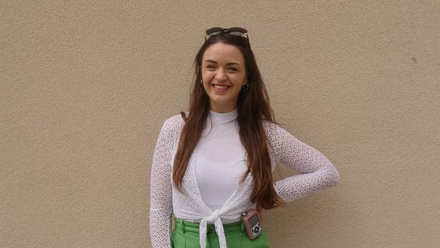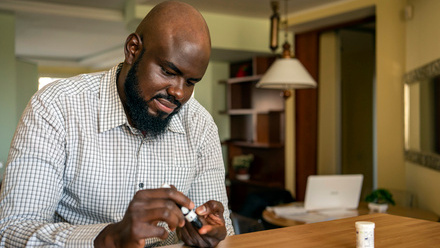Elaine Allerton reports from a trip supporting a diabetes speciality service in Sierra Leone.
I’ve volunteered since I was a student dietitian, primarily within the BDA – media spokesperson, updating Food Fact Sheets, manning stalls at nutrition events...
But in September 2023, I broadened my horizons and answered a Facebook post via Diabetes Specialists Nurse Forum UK Ltd. They were contacted by a small charity called Help Madina (helpmadina.org.uk), which works to improve the health and wellbeing of people living in the Madina/Makeni regions of Sierra Leone. Help Madina wanted support/advice around diabetes care.
Sierra Leone is on the Atlantic coast of West Africa, bordered by Guinea and Liberia. The civil war1 (1991–2002) followed by an outbreak of the Ebola virus (2014–2016) has left the healthcare system in a shambles. Life expectancy is only 56 years2… a humbling thought whilst I celebrated my 55th birthday during our trip.
Help Madina supports the only diabetes speciality service in Sierra Leone at Holy Spirit Hospital, Makeni. This service was launched in 2013. Until 2023, they had no regular access to insulin! They relied upon Help Madina buying insulin in India, bringing it to the UK via hold luggage, then flying it out to Sierra Leone in hold luggage. Who knows how it wasn’t denatured by the travel/transport process?
People with type 1 diabetes had a life expectancy of less than a year… just like it was 100 years ago before the invention of insulin! Even today the government hospitals in Sierra Leone have no insulin.
Our amazing Help Madina MDT included me (diabetes specialist dietitian), Amanda Epps (diabetes specialist nurse), Helen Towers (diabetes specialist podiatrist), Veronica Sawicki (GP cofounder of Help Madina) and Lisa Kelly (former nurse now working in medical communications). None of us had met before working together… some might say that was a risk in itself. How would we get on in a potentially challenging environment?
We flew to Sierra Leone in April 2024 using a grant from Transpetrol Foundation, which covered flights, accommodation, subsistence and vaccinations for three of us. Two of our team were self-funding. I was at my GP surgery every week of January: yellow fever, cholera, diphtheria, polio, tetanus, typhoid, hepatitis A and three rabies vaccinations.
Achievements before the trip
Help Madina were introduced to Life for a Child, which now provides insulin, glucose tablets, glucose test strips and blood glucose meters for people under 30 years old with type 1 diabetes, plus computers to enable recording of data and educational materials. Until spring 2023, there was no reliable access to insulin.
An introduction to Insulin for Life has facilitated provision of insulin, glucose test strips and blood glucose meters for those aged over 30 years.
Personal challenges
On arrival at Lungi Airport, we were bustled outside to meet Veronica, who wasn’t there. We were immediately surrounded by all the airport hustlers offering money exchange and ferry transport to Freetown. This was a frightening experience as we had no local currency or local mobile sim cards. Fortunately, Veronica appeared within a few minutes!
We managed to negotiate our way back into the airport to exchange our sterling for leones and buy local sim cards for our phones. However the bank ran out of leones, so the cashier popped outside to do a deal with the airport hustlers. Then we had a four-hour drive to Makeni, during the dark early hours of the morning, via road blocks manned by men with guns.
It was hot day and night, with temperatures of 40 degrees Celsius. The air conditioning rarely worked and on one night there was no running water. We’d achieve less than four hours sleep per night. This created cognitive challenges resulting in ridiculous mistakes – like being unable to unlock my suitcase. Special thanks to the hospital handyman who sawed through the key to release it from the padlock loop! Phones would not charge as they were too hot… sometimes too hot to hold.
On Friday afternoon, there was an announcement of a lockdown from 6am to 11am for Saturday morning. Police would arrest anyone found outside. This spiked our anxiety levels as there had been lockdowns in November 2023 when there was a militant coup. But this lockdown was for everyone to stay home and clean. The country had very intermittent electricity. The government had not paid their electricity suppliers.
Background of health challenges in Sierra Leone
Sierra Leone has one of the highest tuberculosis (TB) burdens, with a prevalence that exceeds the global average.3 There is high prevalence of HIV/AIDS.4 Poverty, stigma and discrimination associated with HIV/AIDS hinders access to prevention, testing and treatment.
There are water and sanitation challenges,5 resulting in lack of access to clean water. Poor hygiene practices increase risk of cholera transmission. Cholera outbreaks have a significant public health impact with high morbidity and mortality rates.6
Drug addiction is a big issue.7 Addiction to ‘kush’ was declared a national emergency in April 2024. It is a mixture of high-strength cannabis, acetone, tramadol and, some say, human bones. Users appear in a zombie-like state and are very malnourished. Food poverty is an issue.8 The economy is reliant on agriculture, but productivity is low due to reliance on rain, limited access to modern farming techniques and inadequate infrastructure for transportation and storage.
We were told that many people use traditional herbal remedies, as they cannot afford mainstream healthcare. Some of these treatments are harmful, causing burns, blindness and death.
Achievements during our diabetes MDT trip
We clarified that people with type 1 diabetes can eat rice and other carbohydrates, as they now have access to insulin. Previously those subsisting with type 1 diabetes ate just cucumbers and mango leaves, which results in stunted growth. The children with diabetes were on <1% centile growth charts. Our age estimations were often as much as six to ten years out!
We encouraged people with type 2 diabetes to reduce carbohydrates to a fist-sized portion. This will be a huge challenge as they cannot afford protein (whether it be meat, fish, beans or nuts) or vegetable alternatives. Each day, most people eat just two rice meals, plus whatever fruit is free growing in season. To add context, a nurse earns ~£80 per month, and a sack of rice to feed a family of four costs £40 per month.
We ran five early-morning education sessions on types of diabetes, complications, foot care, nutrition, carbohydrate counting and insulin safety. Each session was attended by over 40 nurses, student nurses and healthcare professionals.
Basal bolus insulin is a brand-new concept. We taught the diabetes matron and nurses to calculate basal bolus starts based on patient weight instead of using fixed doses. Carbohydrate counting as we know it in the UK, using insulin-to-carbohydrate ratios and correction factors, will be another project.
We brought over blood ketone strips and meters. These were used when one of our young patients arrived with high glucose levels. Previously urine sticks were used, which are not as accurate. Our patient had confirmed high ketones: 4.4mmol/l. DKA treatment resources were limited to IV saline and cutaneous insulin (no IV insulin), and there are no blood tests to monitor electrolytes. Our patient recovered, but this was an uncomfortable time, knowing that this was not gold standard treatment.
We spent six days in the diabetes clinic, seeing as many of the patients on the caseload as possible. There is no booking system. Patients arrive and queue all day if need be. There is no patient confidentiality – patients will contribute to each other’s consultations.
Helen developed a genius idea to help offload foot ulcers, so we spent the evening altering flip flops by adding fabric loops and doubling up soles. We met the local diabetes association, to discuss zero-cost ideas to improve awareness and reduce stigma. Some believe diabetes is contagious. Men have abandoned families if their wife or child has diabetes, leaving them in dire poverty.
We updated local diabetes guidelines and protocols, being mindful of skillsets and equipment available. We created awareness leaflets, which will be delivered to 42 parish churches in Makeni. Educational materials (Carbs & Cals World Foods books and flash cards) were left with the team.
We visited a rural village outside Makeni to show a documentary about type 1 diabetes followed by a Q&A session, and worked with the film makers to amend a script (from a clinical perspective) for a new film to raise awareness about both type 1 and type 2 diabetes in Sierra Leone.
In Madina, we met the village elders and chiefs to highlight the types, risk factors and treatments of diabetes. We spoke on the local radio, which was translated into four tribal languages: Krio, Sousou, Limba and Fulah. The next day, we screened 84 people for diabetes. We found five new cases of type 2 diabetes. Three people received lifestyle advice, two of whom had fasted blood glucose levels >20mmol/l and were prescribed medications.
We raised awareness of Help Madina and our trip via TikTok, Twitter/X, Facebook, Instagram and LinkedIn… I’ve never been so active on social media! We raised £3,500, which will be used to fund a new diabetes nurse and diabetes/hypertension clinic in Madina for two years. This means people will not have to travel 3.5 hours to Makeni for review and medication collection. If you would like to help fund a diabetes nurse, the Just Giving link is justgiving.com/page/dsnforumukhelpmadina
We visited the Therapeutic Feeding Centre in Madina, which provides inpatient care for 10–12 malnourished children with their mothers/carers. The children receive fortified feeds throughout the day and night and are treated for malaria, pneumonia, TB and gastroenteritis. Help Madina funds the medication and food for the children, as well as food for the mothers. We shared a meal of groundnut soup and witnessed the very fresh chicken being dispatched and processed for our shared lunch.
Since we’ve returned
We continue to educate and mentor via virtual meetings. We’ve arranged for Direct Relief to provide Metformin, Metformin/Sitagliptin combined and Metformin/Glimepiride combined. Life for a Child has requested quotes for another diabetes nurse and funding for solar power to a diabetes centre at Holy Spirit Hospital, Makeni. We are hopeful that they will be able to fund these additional resources.
We hope to arrange another trip in autumn 2025 if Help Madina can source funding or a grant to cover the travel, accommodation and subsistence expenses. It would be good to develop carbohydrate counting further to utilise insulin-to-carbohydrate ratios and correction factors.
There are some incredible charities supporting people living with diabetes in the most challenging environments.
- helpmadina.org.uk
- lifeforachild.org
- insulinforlife.org
- directrelief.org
References
-
britannica.com/place/Sierra-Leone/Post-civil-war
- macrotrends.net/global-metrics/countries/SLE/sierra-leone/life-expectancy#:~:text=The%20current%20life%20expectancy%20for,a%200.67%25%20increase%20from%202021.
- Lakoh S, Jiba DF, Adekanmbi O et al (2020), Diagnosis and treatment outcomes of adult tuberculosis in an urban setting with high HIV prevalence in Sierra Leone: A retrospective study. Int J Infect Dis 96: 112-18
- Babawo L, Sell E, George A, Kaikai D (2020) A five year incidence trend analysis of tuberculosis (TB) and HIV/AIDS co-infection at Bo Government Hospital, Southern Sierra Leone. J Public Health Dis Prev 3: 1-5
- Fayiah M, Kandeh B, Idaho SC, Saccoh S (2024) Rural water management status, threats, and prospects: A case study of Sierra Leone. In: Madhav S, Idaho SC, van Hullebusch ED, Srivastav AL (eds). Water Resources Management for Rural Development. Elsevier, Amsterdam, The Netherlands: 263-74
- Charnley GE, Kelman I, Murray KA (2022) Drought related cholera outbreaks in Africa and the implications for climate change: a narrative review. Pathog GlobHealth 116: 3-12
- Bangura M (2024) Sociological bout on the ‘Kushlization’ of Sierra Leonean juveniles: a Freetown clogging communal health apocalypse. European Journal of Medical and Health Research 2: 75-82
- Volz J, Canagarajah P, Mehta K (2020) The dimensions of local food insecurity in Sierra Leone: cues for technology innovation. In: 2020 IEEE Global Humanitarian Technology Conference (GHTC). Institute of Electrical and Electronics Engineers, Piscataway, NJ, USA:1-8


